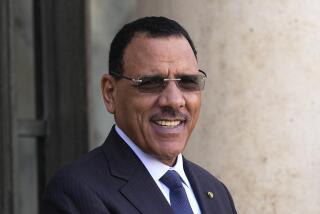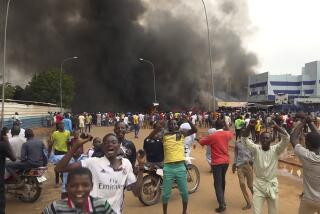U.S. Sheds No Tears for Ousted Pakistani Leader
- Share via
WASHINGTON — Amid growing uncertainty about the plans of military coup leaders in Pakistan, the United States carefully distanced itself Wednesday from its former ally, deposed civilian Prime Minister Nawaz Sharif.
The move appeared to signal a willingness to work with the nation’s new military rulers, who are developing nuclear weapons, as long as they commit themselves to returning the government quickly to civilian control.
“Pakistan’s interests would be served by a prompt return to civilian rule and restoration of the democratic process,” President Clinton said in a statement released Wednesday. But mirroring earlier comments of senior U.S. officials, Clinton’s plea conspicuously omitted any call for Sharif’s return to power.
While declining to speak for attribution, senior Clinton administration officials were unrestrained in their criticism of the ousted Pakistani leader. They described Sharif as a power-hungry politician whose energies were directed more toward undermining press freedom, the courts and his political foes than toward addressing the country’s massive economic and political problems.
“There’s very little shedding of tears for Nawaz Sharif,” acknowledged one White House official. Asked if the administration will push for Sharif’s restoration, the official offered a one-word reply: “No.”
Comments by other senior policymakers were similar in tone and content and left little doubt that the Clinton administration has in effect abandoned Sharif, who was elected in February 1997.
In doing so, the administration appears to be trying to position itself to better influence the military leaders at a point when even they seem somewhat unsure what their next move will be.
Administration officials said they hope that Pakistan’s army will back down before the crisis deepens.
“If there is a civilian government installed, and it’s blessed by [Pakistan’s] Supreme Court, that would be very positive,” said a White House official.
Because Washington already has severed most U.S. economic assistance to Pakistan to protest the South Asian nation’s persistent efforts to develop nuclear weapons, the administration has little direct leverage with the new leadership.
Aside from a brief, predawn television appearance Wednesday to announce that the military had taken control of the country to “restore order,” coup leader Gen. Pervez Musharraf has given no indication of the military’s plans for the predominantly Muslim nation of 135 million.
The coup came just hours after Sharif announced Musharraf’s forced retirement as the army’s chief of staff.
Some analysts said the apparent confusion in Islamabad, the Pakistani capital, suggests that the military had contingency plans for toppling Sharif but no real blueprint detailing what to do next. Others said the delay could signal significant differences among senior military leaders about the direction they will take.
“It’s been a surprisingly long wait,” said Howard B. Schaffer, a former senior U.S. diplomat in the region who is now at the Institute for the Study of Diplomacy at George Washington University.
Paula R. Newberg, a South Asia expert and author of a book on Pakistani politics, said Musharraf’s televised address was notable as much for what he didn’t say as for what he did.
“It’s not clear if this is a military coup,” she said. “He hasn’t said that he’s taken over the state. He hasn’t dissolved the National Assembly. He hasn’t closed the courts. He hasn’t declared martial law. What you have is a work in progress.”
Teresita Schaffer, director of South Asia programs at the Center for Strategic and International Studies, a Washington-based think tank, said the army appears to be seeking a “legal context” for its actions.
Amid this uncertainty, Clinton administration officials were notably cautious in their public remarks, stressing only the fluid nature of the situation and their desire for a swift return to democratic rule. They pointedly avoided using the word “coup” to describe the takeover.
“We need to see the direction they are going to take,” White House Press Secretary Joe Lockhart told reporters. “We call very clearly for the earliest possible restoration of democracy and constitutional rule in Pakistan.”
State Department spokesman James P. Rubin said U.S. Ambassador William Milam, who had been in Washington for consultations, departed Wednesday night for Pakistan to reinforce the administration’s desire for a quick end to military control.
In declining to offer any support for Sharif while insisting on a return to democracy, Clinton appears to have concluded that the man elected by a wide margin had failed the democratic system that put him in power. Sharif visited the White House twice this year and was warmly welcomed by Clinton each time.
European governments adopted a similar stance toward the coup, issuing calls for restoration of democracy but omitting any reference to Sharif. Clinton discussed the situation by phone with British Prime Minister Tony Blair, officials said.
U.S. officials said the military authorities in Pakistan might announce elections to replace the government, ask the parliament to choose a new prime minister or create a process to install a caretaker government of technocrats until democratic reforms are in place.
“There is always the possibility they could impose martial law, though that seems the least-favored option even within the army,” said another White House official. “They seem to be seeking to restore some measure of civilian authority. At least that’s what we’re hearing.”
Despite initial concern about the fate of Pakistan’s fledgling nuclear arsenal, U.S. officials downplayed talk of heightened dangers.
“It doesn’t change anything on the nuclear side,” said an administration official. “In Pakistan, the nuclear weapons were effectively under military control before. That remains the case. We have no reason to think there have been any problems.”
Instead, senior officials cited other concerns, such as the long-term stability of Pakistan, a country that has consistently produced weak, corrupt and ineffective civilian governments.
“This is a country whose economy is in bad shape, whose government is in flux and whose security and intelligence services have nurtured extremist groups in [Indian-held] Kashmir and [in] Afghanistan,” said one administration official. “If you mix that together, that’s a pretty explosive mix.”
Others focused on the coup’s impact in a region armed with nuclear weapons and already bubbling with political turmoil.
“With the military takeover in Pakistan, it creates a new level of uncertainty,” Secretary of State Madeleine Albright told an audience in Orono, Maine. “The Indians have gone on military alert also.”
In addition to India, countries such as Iran, which is involved in a proxy war with Pakistan in Afghanistan, and China, which has long viewed Pakistan as its major ally in South Asia, have been unsettled by the coup, U.S. officials noted.
More to Read
Get the L.A. Times Politics newsletter
Deeply reported insights into legislation, politics and policy from Sacramento, Washington and beyond. In your inbox twice per week.
You may occasionally receive promotional content from the Los Angeles Times.










